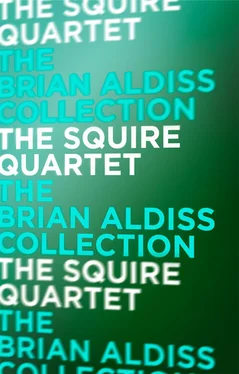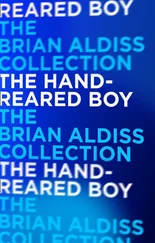‘No, no, Mr Squire, honest, you don’t see, neither my brother nor me are at all political. This is purely and simply a sporting event.’
‘Things aren’t so simple. It’s not what you are, Mr Jarvis, but what you lend yourself to.’
‘No, you’ve got it all wrong, Mr Squire. I know you like politics, but, see, I’m just a businessman, pure and simple, out to make an honest penny, and I hate politics. So does my brother.’
After a drive round, Squire found a parking place in Mancroft Street. Locking the Jag, he walked slowly through Tombland, enjoying the sunshine, stopping occasionally to glance in a shop window. At the bookshop, he walked in and gazed at the books, but saw nothing he wished to buy.
The offices of Challenor, Squire, and Challenor, of which William Squire was senior partner, were built of mellow Georgian red bricks, very similar to the bricks of Pippet Hall. The facade of the building was covered by a venerable virginia creeper, the leaves and suckers of which lapped at William Squire’s office window. William had officially retired the previous year, but still worked every morning, looking after old clients of many years’ standing, who refused to transfer their business to the brisk young partners who occupied the lower floors.
Uncle Willie’s office was at the top of the building. The floors below had been modernized, their small rooms broken down into an open-plan scheme which let in more air and custom, rather in the same way that the fields beyond Norwich – the title deeds to which reposed, in many cases, in the archives of Challenor, Squire, and Challenor – had been stripped of their hedges to let in more air and agricultural machinery. Squire made his way past empty desks and silent computer screens to the third floor.
Uncle Willie’s office was a small room on the side of the building, with a window from which the cathedral could almost be seen. Uncle Willie was pottering round smoking his pipe, with the rather sulky-looking Nicholas Dobson in attendance. Dobson was a nephew who had high hopes in the firm. He lived nearby. His expression suggested that he would rather be elsewhere on a hot summer Saturday morning, but he greeted Squire cheerfully enough.
Coughing, Uncle Willie rested his pipe in a marble ashtray and came round the desk to shake hands formally with his nephew.
‘You’re looking fit, Tom. Gallivanting round the world has been good for you. We’re heading for a drought, could be worse than last year, and that won’t please most of my clients.’ Willie bore a strong resemblance to his dead brother John, Tom Squire’s father. He too had a high-bridged nose and a pugnacious set to his jaw. The deep-set lines of the family face had visited him too. So had the clear skin. Although his hair was white, it remained thick.
Thomas thanked his uncle for seeing him on Saturday, although he knew that the old man, a widower for many years, often visited the office on Saturday mornings in order to keep the lethargy of old age staunchly at bay.
The years had hunched his shoulders. He regarded his nephew with a vaguely aggressive air, and then transferred his gaze to the open window.
‘How’s Teresa?’
‘She’s fine, Uncle. How are the cats?’
‘I’ve had Nickie spayed. She was turning into a regular kitten-factory. Madge, is she all right? Still staying with you? Terrible about Ernest. Madge makes a pretty widow, poor lady. How’s she taking it?’ As he spoke of Mrs Davies, he walked over to the window and looked out.
‘She seems cheerful enough. It’s Teresa who’s upset.’
‘In my experience,’ said Uncle Willie, still gazing out of the window, ‘widows are not too unhappy when they are left to pursue their own lives, though they may make a polite show of grief. It’s different for widowers.’
He turned and inspected his nephew, to see how the remark had registered.
‘Teresa’s having a series of nightmares. Always the same, though details differ. Sometimes it seems to be day, sometimes night. She is sitting or lying down when she sees a dark male figure outlined against the window. Someone is trying to break in. Sometimes she tries to scare him away, sometimes she runs from him, sometimes she wakes to the sound of smashing glass.’
‘Oh, she’s afraid of burglars while you’re away.’ He went over and picked his pipe up, as if the matter was disposed of.
‘There might be another explanation. She complains of back pain. She keeps talking about – well, cancer. She goes to Dr Bell. He gives her analgesics, and she’s gone to the Norfolk and Norwich for check-ups. All reports are negative to date.’
From the other side of the room, Dobson said, ‘They say cancer’s psychosomatic.’
‘Nicholas thinks everything’s psychosomatic, including taxes,’ Uncle Willie said. ‘Do you think she’s got cancer, Tom? Eh?’
‘No, I don’t … I’m anxious, of course, but the tests, as I say, are negative. People do get these ideas, and I wonder if the dream doesn’t indicate something of the force of Tess’s obsession.’
‘Well.’ Uncle Willie shuffled with some papers on his desk, as though he had lost interest in Teresa. ‘I hope that now you’re back home you’ll both settle down, you and Teresa. She’s a good girl but she needs a bit of looking after, don’t forget that.’
Squire considered saying more on the matter, caught Dobson’s eye, and decided against it. He turned to other things.
His London firm had been understanding, and had allowed him maximum freedom during the planning and filming of ‘Frankenstein Among the Arts’; now he had to notify them that he would be away longer than anticipated. He wanted his uncle to draft a proper letter, waiving his salary. There were also some long-standing matters which needed attention, such as a protracted argument with the local authorities over a right-of-way across Pippet land. Dobson brought out his file, and they talked for thirty minutes.
‘Business over,’ Willie said at last. ‘Nicholas, leave the file out and we’ll go and have a coffee.’
Downstairs, at the side door, he made a great business of seeing that the security bolt was functional. Dobson directed a pitying look over his bent back at Squire. Then they sauntered over to a coffee shop almost opposite St Ephraim’s Gate, Dobson walking smartly ahead.
‘They’re still talking about putting a motorway through to Bury and Chelmsford,’ Uncle Willie said, as they selected a table, looking with some dislike at the holiday-makers who surrounded them. ‘Then they’ll continue it up here. It’ll mean the end of East Anglia’s isolation, and the end of Norwich and Norfolk as they have been for centuries.’
‘Don’t worry, Uncle,’ Dobson said. ‘In the present state of the country’s finances, they’ve stopped building roads. Norwich will be safe for this century.’
‘I’m not so sure.’ He picked up the menu with contempt. ‘Once a planner has planned, and lodged his plans in Whitehall, the abstraction seems to acquire an existence of its own … Well, you offer some consolation for our bad trade figures, if they help to protect tradition.’
As the waitress came up, he smiled at her and said, ‘I suppose you’re still making coffee here in the traditional way – with instant coffee?’
She was young and pleasant-faced. She leaned forward, smiling, and supported her weight by resting one hand on the table. ‘I know you’re very fond of our coffee, Mr Squire, and it hasn’t gone up this week.’
‘In that case, we’ll treat ourselves to a cup each,’ he said, looking up at her in a sprightly way. When the girl had gone, he shook his head and said to his nephews, ‘When I was a young man, you were not supposed to address remarks to the waitress. It was bad form. Rigid class structure. I prefer the way things are today. I discovered at quite an advanced age that I enjoy flirting with waitresses. They don’t seem to mind, so why not?’ He blew his nose on a large white handkerchief. ‘The war changed things. Changed everything. Of course, no one knows exactly what waitresses think, doing the job they do.’
Читать дальше












